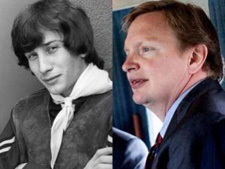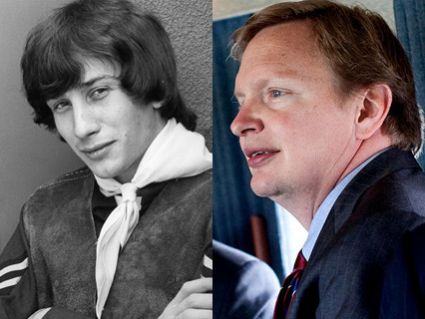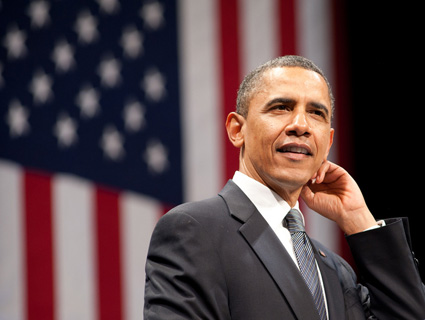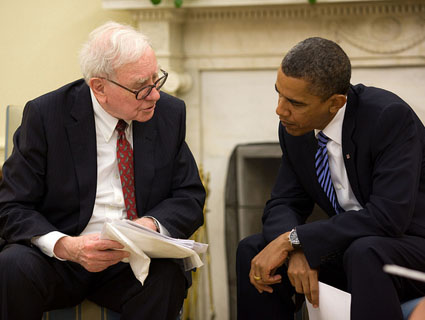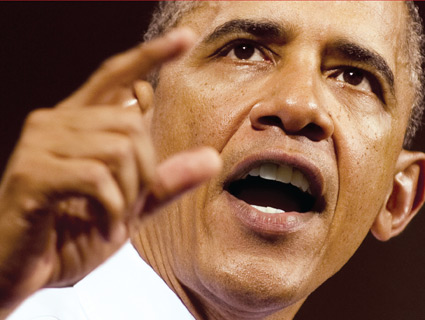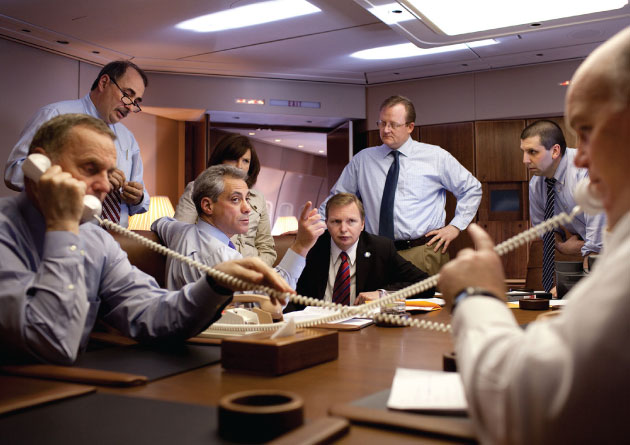
Jim Messina, center, in red striped tie.Pete Souza/White House
A year into the Obama presidency, then White House deputy chief of staff Jim Messina held a private West Wing meeting with gay rights leaders. The president, he told them, was preparing to fulfill his campaign promise to repeal Don’t Ask, Don’t Tell, and he had devised a plan. Secretary of Defense Bob Gates and Joint Chiefs of Staff Chairman Mike Mullen were ready to support the repeal—but only if the Pentagon could first conduct a study on how best to implement it. And that could take up to a year.
The advocates were delighted—but they also worried that on this schedule, there might not be a vote in Congress until after the 2010 midterms. Bills to eliminate the ban were already moving on Capitol Hill; the grassroots were fired up. Why not proceed immediately? they asked. The timing was not open to discussion, Messina said. He and the other White House aides sat stone-faced as it dawned on the advocates that they were not being consulted. They were being informed.
Through the next 10 months, Messina stuck with the scenario he’d laid out and took the heat from those who feared the White House wasn’t truly committed to the cause. Sure enough, the repeal was delayed until after the midterms—but then, with Messina in charge of the final push, it passed.
The episode had many of the hallmarks of an Obama success: Messina ticked off allies, juggled conflicting political tasks, and persisted all the way to a tough, close, down-to-the-wire win. Soon afterward, the president handed the then-41-year-old operator his next big challenge: managing his 2012 reelection campaign. It was the ultimate sign of confidence—a signal that Messina understands and reflects the ways of Obamaland.
Messina first joined the Obama team as chief of staff to David Plouffe, the stoic and taciturn 2008 campaign manager who relished message discipline and number-crunching. Rail-thin and tall with a boyish face and ruddy complexion, he fit in well with the insular, metrics-obsessed Obama crew. Messina is a true campaign rat who has said he prefers the war room atmosphere to the grind of governance, once noting, “I miss how bad a campaign office smells at midnight.” (He told an interviewer in 2007 that his biggest campaign vice was “grease,” recalling that he once ate 27 consecutive meals at McDonald’s, upsetting his girlfriend.) “I personally couldn’t tell you what he believes in,” says a former campaign staffer who collaborated with him. “But he does reflect one distinguishing Obama quality: pragmatism.”
After Obama won the presidency, Plouffe took time off to write a book and do some consulting, while Messina followed Obama to the White House. There he became known for being as hardcore as his boss, Rahm Emanuel, if not always as profane or flamboyant. (He does drive a Porsche.) He has referred to Emanuel as the “smartest political strategist of his generation.” Some colleagues called him “mini-Rahm.” It was not a compliment.
As deputy chief of staff, Messina kept a low public profile—he wasn’t a cable TV fixture—but developed a reputation as the guy who could take care of the president’s problems. A Treasury secretary nominee with a tax issue? Messina smoothed it over in the Senate. Tracking how various agencies would spend stimulus dollars? Messina was on it. The Washington Post dubbed him “Obama’s fixer.” He wore the label proudly.
Messina especially played the operator during the messy health care reform debate, when he cut deals that liberal advocates questioned. Before he joined up with Obama, his career had been mostly devoted to centrist Montana Sen. Max Baucus—who Messina once said was “like my father”—and some believed that this connection led the White House to put too much faith in Baucus’ failed attempt to craft a health care compromise.
What you have to understand about Messina, says Ben LaBolt, who now works with him as the campaign spokesman, is that he “doesn’t come to a meeting and restate a problem 30 times. He cuts through to a rational solution as quickly as possible and asks the same of others. He’s not interested in dying on his sword to prove a point like too many people in politics are.” When asked to explain his effectiveness, Messina once explained, “If the White House deputy chief of staff calls you, you take the fucking phone call.”
As the White House’s ambassador to Washington liberals—unions, abortion rights groups, environmental organizations, and general advocacy shops—Messina organized regular Tuesday meetings known as the Common Purpose Project to discuss White House plans, priorities, and messages with these groups. The goal was to coordinate White House strategy with the organizing activities of these outfits. But some of the outside participants considered the meetings mostly sessions where the administration tossed out talking points and marching orders. “Common Purpose was put together to manage the outside groups,” says a Democratic strategist involved in its formation. “To keep them under control as much as possible. It aimed at manipulation more than organizing. Here was Jim Messina, the deputy chief of staff, coming to meetings, and people would be docile because they were getting access to the White House.”*
In one notable episode early in the administration, the group Campaign for America’s Future started pressuring moderate and conservative Hill Democrats to back Obama’s budget. Messina called CAF’s leaders to the White House and ordered them to stop. “We know how to deal with the Blue Dogs better than you,” he said. “You’re complicating things.” If CAF wished to stay in the White House’s graces and keep being invited to meetings, it would have to submit.
Lefty discontent with Messina exploded with a 2011 Nation article that maintained he had “clashed with progressive activists and grassroots Obama supporters…alienating parts of the very constituencies that worked so hard for Obama in 2008.” But Messina was no middle-of-the-road Svengali nudging Obama toward the center. He was doing the president’s bidding—crafting deals to hammer together legislation that could pass a dysfunctional Congress. Messina “does have a soft side and a heart,” one Democratic consultant notes. At the end of the Don’t Ask, Don’t Tell effort, as the Senate was voting to end the ban, he stood off the Senate floor with gay rights advocates and teared up. He calls it one of the proudest moments of his career.
As the Obama team geared up for the reelection fight, Plouffe returned as a senior White House strategist, and Messina was dispatched to manage the campaign behemoth based in Chicago. But first, he and other White House staffers accompanied Obama on his Christmas family vacation in Hawaii, where Messina holed up in his room at the Surfrider Hotel on Waikiki Beach and pored over books about presidential elections. He took notes on large pieces of butcher paper and hung them on the wall. “It was like A Beautiful Mind meets The War Room,” recalls Bill Burton, who was then the deputy press secretary. “He had given himself a college course on presidential campaigns and emerged a fairly unequaled expert.”
Messina won’t say what specific lessons he gleaned from all this cramming. But he’ll need all the historic background he can get as he takes on the biggest challenge of his career: turning the contrast between Obama and the GOP into an on-the-ground crusade that galvanizes a discontented base.
Messina favors striking an aggressive stance in trumpeting the big-ticket accomplishments of the Obama administration—even those that hurt Democrats in the 2010 midterms. “Let everyone know: ‘I like Obamacare,'” he wrote in a March email to supporters. “‘What’s not to like?'” It was a classic move: adopt the attacker’s language to undermine it. Health care could be a selling point for the president, he told me, as long as the campaign could frame the question as, “Do you want Republicans to take away your mammograms and colonoscopies or insurance for preexisting conditions?”
Messina is an expert on wielding power in the small circles of Washington. But now he must mobilize a grassroots colossus that just in 2011 recruited tens of thousands of foot soldiers and hundreds of thousands of small-dollar donors. (Through the first quarter of 2012, about 50 percent of donations were under $200.) A big part of his job is to build rapport with those folks and keep them motivated—while also nurturing the heavy hitters. In one email to the troops in April, Messina slapped Karl Rove for saying the president wasn’t up to his job and warned that a Rove super-PAC was raising $200 million from big donors. Weeks earlier, he’d had a meeting with big-ticket Wall Street donors, assuring them that Obama wouldn’t be demonizing Big Finance during the campaign.
At Chicago HQ, Messina oversees an extensive voter contact program in which thousands of volunteers talk to potential voters, asking them what they think of the president. The results are stored in databases that log the concerns, pet issues, and voting history of each one. As of late 2011, a million such contacts had been made, and Messina told me the leading causes of disenchantment among Obama-friendly voters were the president’s abandonment of the public option and lack of progress on climate change, immigration reform, and closing Guantanamo. One key goal for Messina: figuring out how to allay these strongly held concerns.
His plan revolves less around James Carville-like framing and more on the mechanics of reaching and turning out potential supporters. “All politics is local,” the maxim coined by former House Speaker Tip O’Neill, is the mantra for Obama ’12. “Last time it was change we can believe in, becoming a national movement,” Messina told the New York Times in March. “This is a series of very local campaigns. No one’s ever tried to do that in a reelection campaign.”
Messina’s team has been drawing up customized blueprints for the swing states it aims to win—Colorado, North Carolina, Virginia, and others—working out the best ways to comb mailing lists, voter registries, and other data to find the most likely Obama voters and get them to the polls via highly targeted tweets, Facebook posts, emails, text messages, phone calls, and old-fashioned door-knocking. In something of a test drive in November 2011, Obama volunteers in North Carolina—responding to specific emails from Chicago—went to events and canvassed door to door to get their voters to the polls. This helped Democrats trounce Republicans in local elections. (In the Wisconsin recall election this month, the Democratic ground game was not as successful.) At the start of this year, Messina was looking to develop 20,000 volunteer teams across the nation, and he has told reporters he is building the “biggest grassroots effort in American political history.”
To some, Messina may symbolize all that is conventional about the Obama presidency. His mission, though, is not to alter the political culture, but to build a winning campaign. Until November 6, his definition of hope will be determined by that narrow and easy-to-measure goal.
*This paragraph has been modified for greater clarity.


